![]()
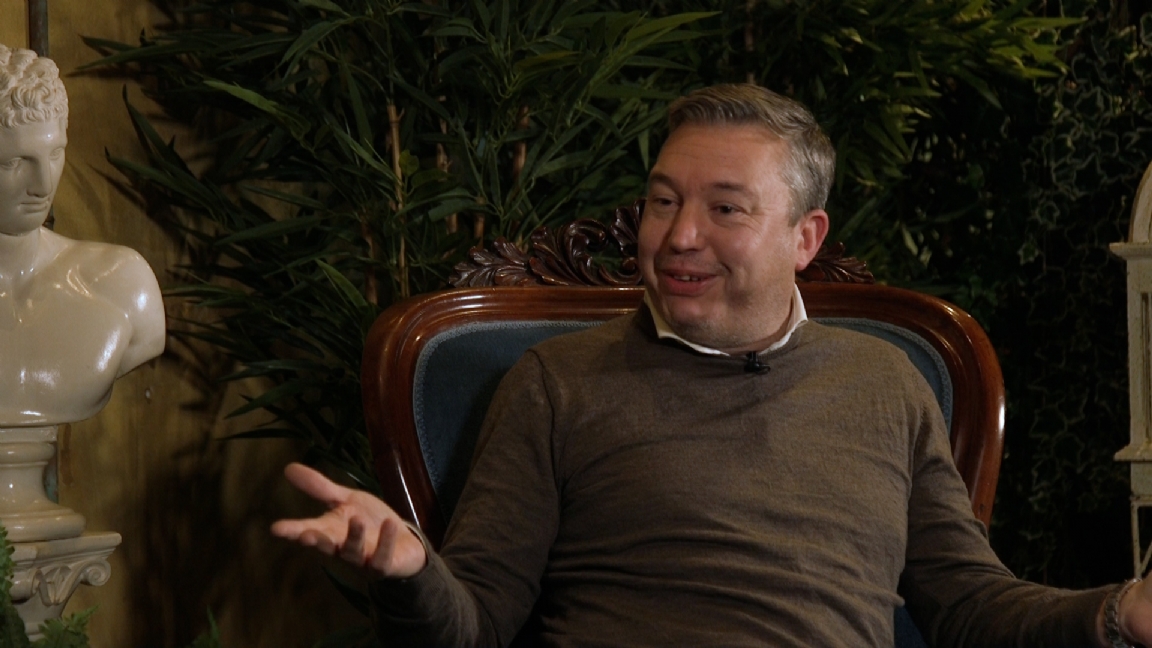
In the second season of Leaders Presenter Justus Dingemanse receives familiar faces from Dutch football journalism in Restaurant & Bar NOLA in Utrecht. On the basis of interesting anecdotes, they provide a glimpse into the media world full of press rooms, broadcasters and tight deadlines. In this episode, ‘International Football Writer’ and Feyenoord club watcher Martijn Krabbendam takes the seat next to Justus. He talks about the art of calling, his admiration for Johan Derksen and ‘his best friend’ Graziano Pellè.
By Justus Dingemanse and Kevin van Buuren
Normally the journalist himself calls the people to have their say. It is the art that he sees as essential to his professional existence and which he sees less with young professionals. Calling even gave Krabbendam his first scoop as an intern at Trouw, which later turned out to be a kickstart for his football career. “I knew Oscar Moens from Maassluis, who called me that he had something for me. That was great, because I was just doing an internship.” That ‘something’ turned out to be big news: “He said: ‘I’m going to sign with AZ for ten years.'” It was one of the first football firsts of Trouw.
In any case, nothing more was needed than a simple call, with which Krabbendam rolled into journalism. He simply called the local newspaper to ask if he could type bits. It is advice he wants to give to aspiring journalists: “I don’t think tapping a piece can be learned at school.” He relates his answer to himself: “For me it’s more feeling than structure, that comes when you’re typing.” In particular, by reading interviews and writing independently, Krabbendam managed to turn himself into a journalist, without too much guidance.
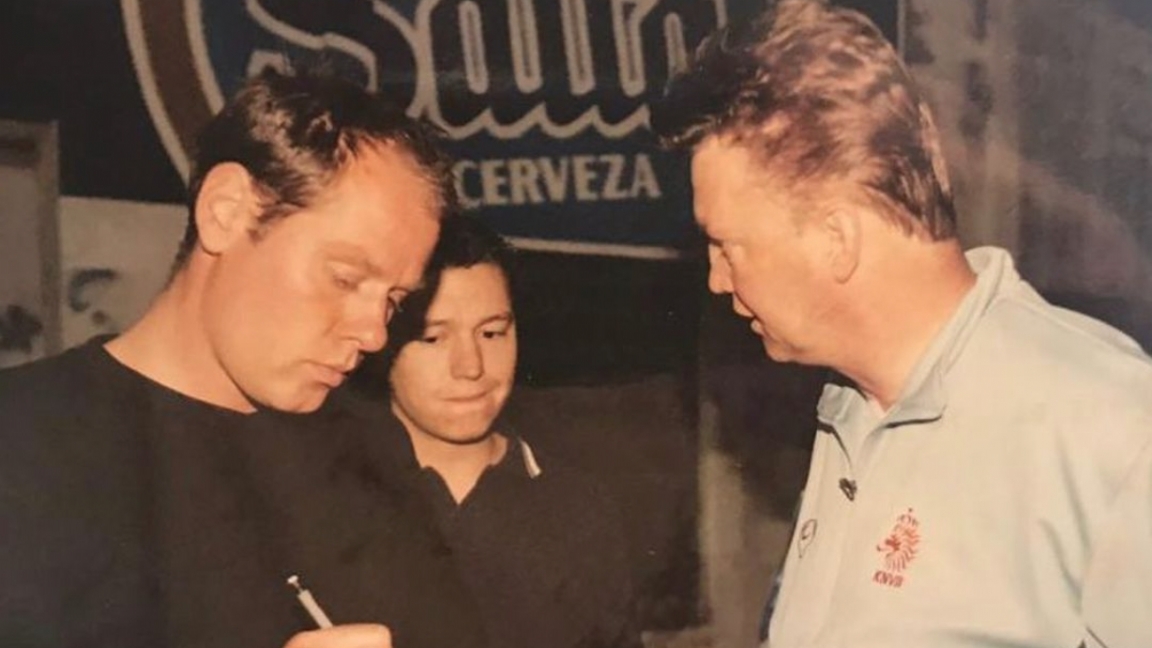
A young Martijn Krabbendam attends one of Louis van Gaal’s famous lectures.
Through thick and thin with Derksen
He didn’t get that guidance from Johan Derksen, who he got on the phone as a starting journalist when the moustache had heard that young Martijn had talent. “Saying no to Johan was not an option. And I wanted to write about football, where could I do that better than at VI?”, he says firmly. Krabbendam was also immediately liked by Derksen, although that was not necessarily from the point of view of a mentor. When asked what he wanted to earn, Krabbendam could not answer. “I get an internship allowance at the Trouw”, he stammered. “’Then you’re completely hired!’, Johan shouted”, the guest says with a laugh.
“I learned everything from Johan. How the football world works, that you have to be yourself and write down what you see and hear.” But Krabbendam’s teacher could also terrify his employees: “If you were not sharp for a while, it was the superlative. A failure! You really had to be careful! But after the fourth time you said: ‘No worries, Johan’ and you knew it was good.” On the other hand, Derksen always stood behind his editors, as long as they did their job well. Even if that person was no longer welcome at a certain club.
“I had been to Robin van Persie, to Arsenal. Robin always spoke well about football, but he also caused that accident on the M5.” Krabbendam made ‘a box’ in the VI with details of the accident. When Arsenal reacted to the first draft of the piece after a long time, it was already too late. “Stopping the pressure is a bit difficult because it’s in the store tomorrow. Lawyers and all that. I was never allowed to come to Arsenal again,” he says. “Obviously, when you experience that for the first time, you get nervous. But Johan said: ‘Then we won’t go to Arsenal, will we? That was a good story!’”
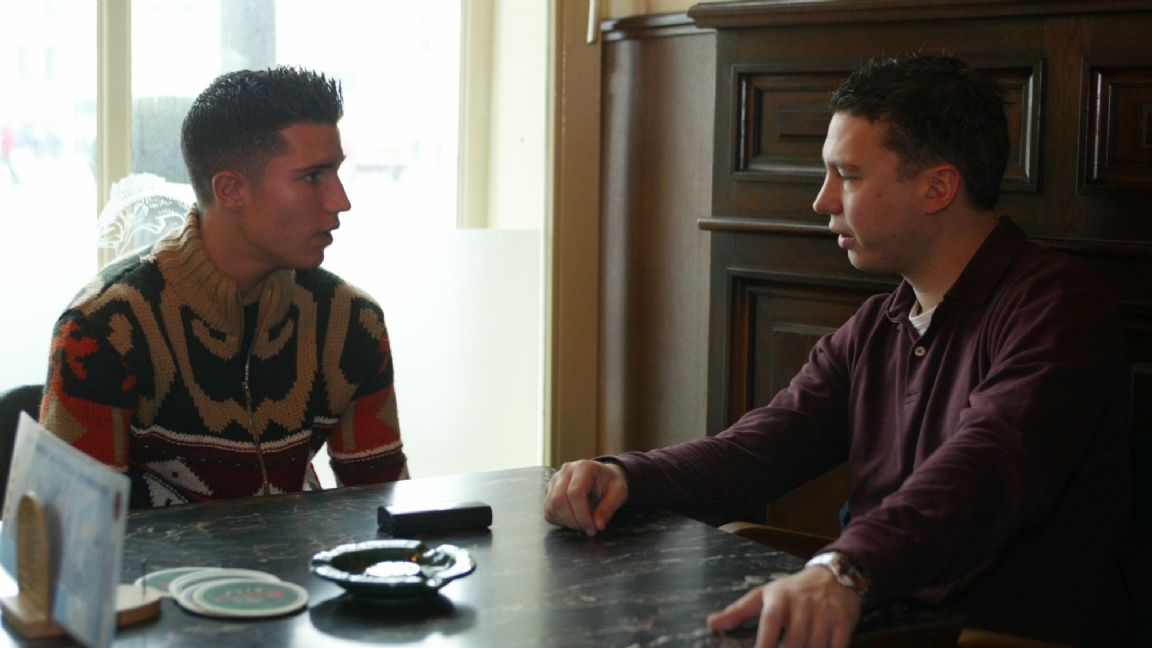
Robin van Persie in conversation with Martijn Krabbendam at a time when the ashtrays were still on the table.
Derksen, however, also showed Krabbendam the other side, when he stood up for people about whom the journalist wrote a piece. “I remember well that I called Fritz Korbach from De Graafschap to see if there was anything else going on.” It turned out that a match was postponed because of the fair, which Korbach clearly did not agree with. He went all out: ‘We have a mayor here, who can cycle to the whores as far as I’m concerned.’ And I tap, tap, tap.” In the end, Derksen referred the piece to the trash.
“He asked what time I called him. Just after dinner. Johan knew that Fritz had had a small drink at the time. He didn’t want me to take advantage of someone who might not have remembered what he was saying.” The crisis at DSB Bank, former AZ sponsor, also did not want Derksen featured in his magazine. The Dutch Central Bank pulled the plug on DSB in 2009 due to malpractice. AZ also ‘didn’t come out very well’, Krabbendam knew, who wanted to report on the scandal. “That costs us tons, I also have to keep 60 people working here,” the editor-in-chief told him.
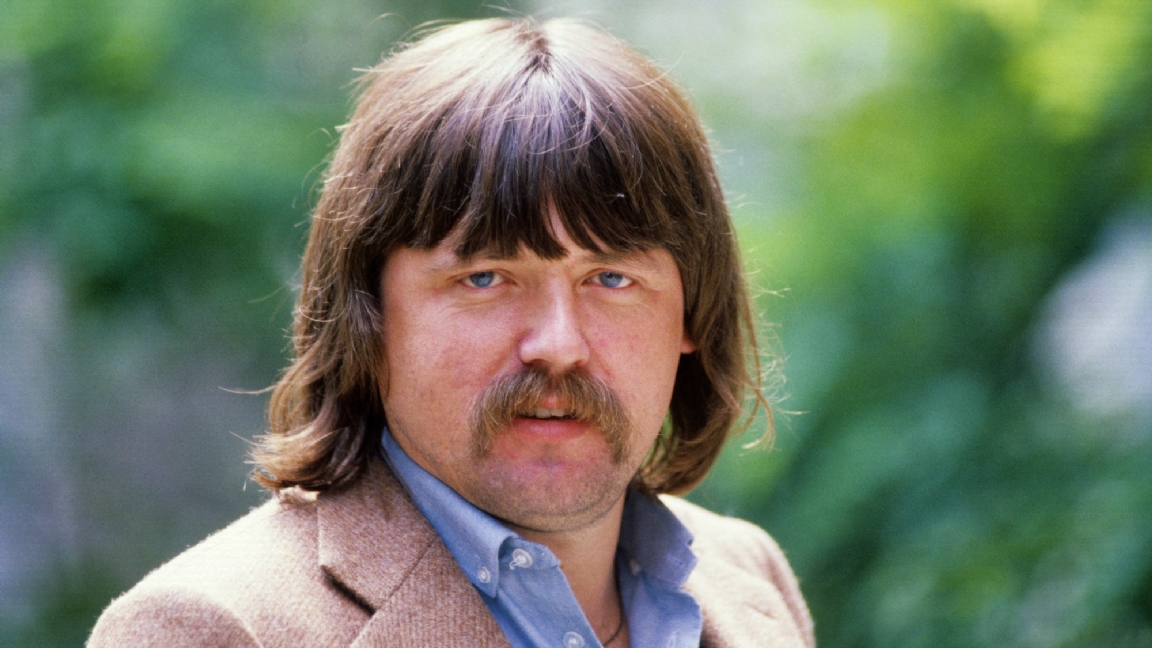
Martijn Krabbendam says he learned everything from Johan Derksen.
Crazy Graziano Pelle
Would Krabbendam ever make the same choices as Derksen? He doesn’t do journalism to make friends. Although there was one job for which the writer uses the word friendship. “I had a boyfriend, once. That was Pelle. That was a party for a month. He’s absolutely crazy, of course, in a fun way,” he says. The two spent a lot of time together writing the book Pelle speaks to realise. A book that, incidentally, cannot be compared with some of the bestseller figures from other guests of Kopstukken.
“It was just 1000 questions to Pellè, more of a nice thing”, Krabbendam defends his work. The journalist especially loved the process: “Those lunches were unforgettable and I had the advantage of knowing everything about Pellè.” Useful knowledge in a period when the Italian striker became the absolute cult hero of the Legion. The club watcher soon knew that ‘the tall one from AZ’ would succeed at Feyenoord. “I always do that, I just ask the players how he trains. “That’s a real phenomenon,” they all said.”
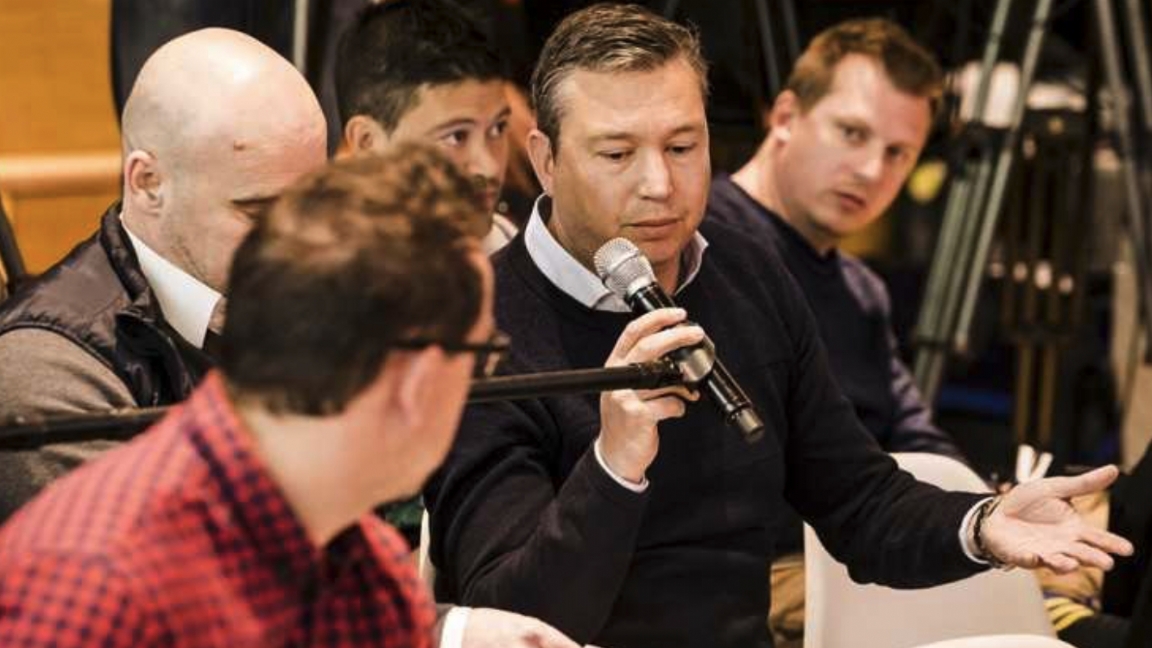
Martijn Krabbendam asks a question during a press conference.
The largest amateur club in the Netherlands
As a Feyenoord club watcher, Krabbendam was not only close to the players, but he saw the entire club. “Feyenoord is the largest amateur club in the Netherlands, in the best sense of the word. That’s because of accessibility, that I can just call the Supervisory Board if I want to.” Born Schiedammer, he has been watching the club’s matches since his internship at Trouw, where he gratefully made use of the official press card that he carried on behalf of the newspaper. But he has never been or became a fan of the club: “I don’t understand that anyway, club love.”
It is the distance that allows him to do his job. For example, Krabbendam saw the resignation of former trainer Gert-Jan Verbeek coming. His writing predicted exactly what happened. “Too bad for such a boy, but I did my job very well then”, he recalls. However, his inside work is not always appreciated. The journalist was even boycotted for a while, during the period that Van Bronckhorst was in charge. The team didn’t want to talk to Krabbendam anymore, although he wasn’t that impressed: “The players told me that it was all different. But I was too critical of then director Martin van Geel. It has made people crazy to go along with it.”
Justus discovered in a survey on the street that the fans of Feyenoord are not always happy with the critical Krabbendam. He confirms with a laugh that he ‘wouldn’t be a real Feyenoord fan’. And the recommendation to ‘seek another profession’ doesn’t bother him: “I get it. When you love something, you are critical and then it is annoying when an outsider has that criticism too.” Justus is curious whether ‘fear reigns’ at Feyenoord, given the recently resigned board members. “Because so many different parties have influence, Feyenoord has no stability,” he says firmly.
Just to be clear, the club watcher wishes the Rotterdammers the best: “Glad that things are going better now. I give them that too. But, if there are problems again, I will write them down again.” He has no use for the message of others. “What do I care if Guus Til is mad at me and doesn’t want to talk to me anymore? He should know that.” He knows in the end that everything will be all right. “I also thought Kuyt was a huge dick five years ago. Everything wears out on me.”
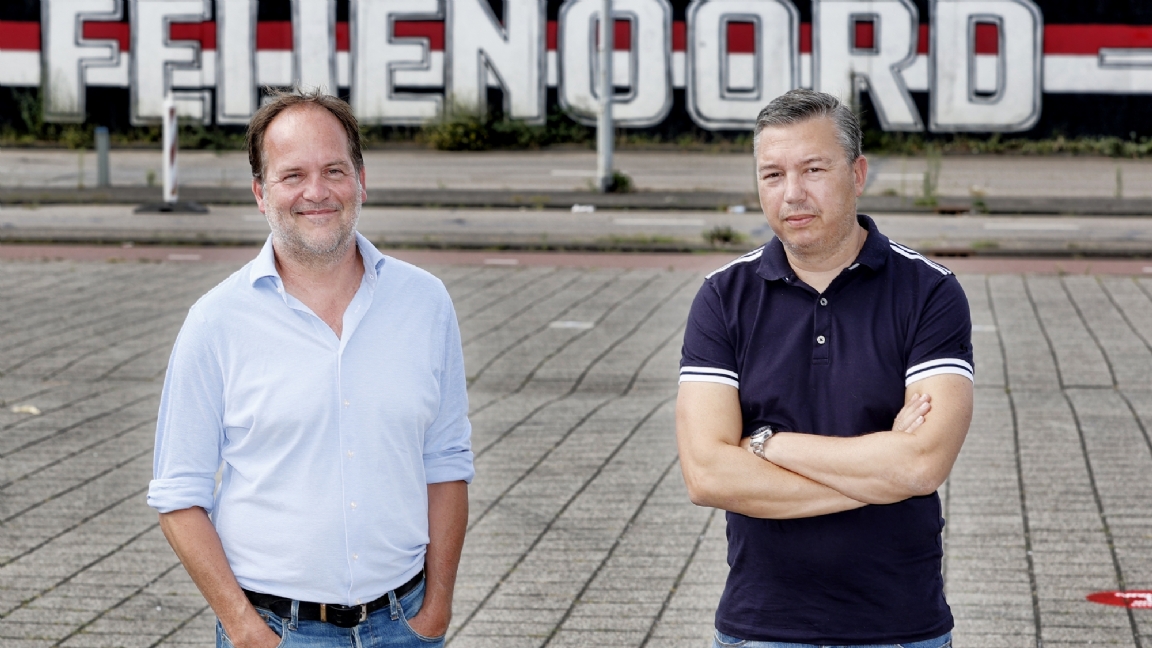
‘Head of Opinion’ Michel van Egmond and ‘Internal Football Writer’ Martijn Krabbendam.
Powerful character trait
Not caring about others, Krabbendam names the weapon of his career. “I’ve never tried to be liked, which is a useful trait in this world.” He also knows that as a journalist ‘in the field’ you have to be curious, call people and ask ‘how it is’ as often as possible. “There’s so much in that. Now when I ask Jahanbakhsh how it goes. Not so good, probably. Then you hear why that is.”
He once also asked Henk ten Cate that question, when Krabbendam actually expected a positive answer beforehand. “I knew that Van Breukelen was going to him to maybe make him national coach. Then I’ll come afterwards, I thought.” After an Asian Champions League match in Abu Dabi ‘in front of fifty men in a gigantic stadium’, he saw Ten Cate’s face on a thunderstorm. “He said: ‘I was national coach this morning, but Hans van Breukelen suddenly has doubts.’” The almost national coach let Krabbendam listen in next to him in the car to the special telephone conversation with the technical director. In the end it turned out that the listener had saved Ten Cate from failure when it was his word against Van Breukelen’s: ‘that is the advantage of going somewhere and being there.’
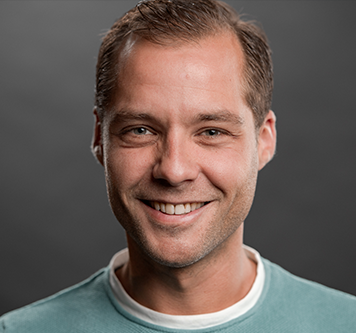
Justus Dingemanse is a full-time presenter and program maker at Voetbalzone and makes contributions in the form of exclusive interviews, reports, documentaries and programs.
